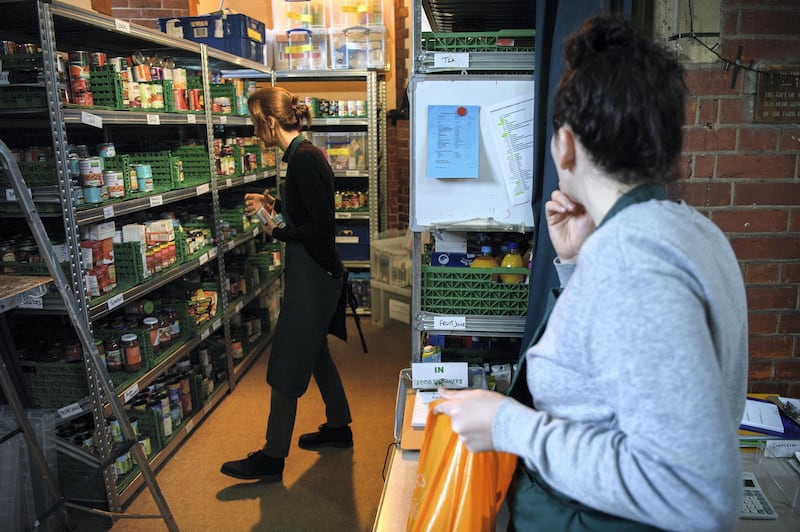Volunteers in my local supermarket are relentlessly cheerful. They direct shoppers to large bins, where those who wish to drop off tins of beans and soup, packets of rice and pasta, and other non-perishable items. These donations are distributed through a food bank to families who do not have enough to eat.
Although similar collections happen throughout the year, the UK's food banks are particularly busy in December. Christmas tends to bring out the British public's charitable side – which is just as well, because for an increasing number of people, the winter holiday period is a time of serious financial hardship.
This fact is now widely acknowledged. Teachers even encourage children to bring donated food to school and – equally important – to remember that a growing number of people in their own communities often go to bed hungry.
One of the country’s most interesting food writers, Jack Monroe, is known as the “Bootstrap Cook”. As a young mother on a tight budget, Monroe wrote a blog detailing ways to make nutritious meals from very little, and, over time, became a well-known writer, newspaper columnist and political commentator. Monroe’s new cookbook includes recipes made “entirely from tins”, and profits from it will be donated to food banks.
These acts of charity show the very best sides of human nature, but in a country as rich as Britain, it is sad that they are necessary. The UK has the world’s fifth-largest economy, yet the number of food banks and the amount of people using them is rising.
The statistics make for depressing reading. The Trussell Trust operates several hundred food banks and says the number of users rose from tens of thousands in 2010 – which is bad enough – to more than half a million in 2017. It is estimated that as many as 2,000 food banks operate across the country.
Britain is not the only affluent nation where people go hungry. The charity Feeding America estimates some 40 million US citizens, including 12 million children, suffer from “food insecurity”. Worldwide, the Hunger Project calculates that one in nine people – more than 800 million, mostly in developing countries, but a growing number not – are considered chronically malnourished.
That brings us to the next shocking statistic. Around a third of the food that the world produces goes to waste. The Food Aid Foundation reports that Malaysia, a fast-developing country, produces approximately 15,000 tons of food waste every day. Globally, an annual total 1.3 billion tonnes of food is discarded, rather than eaten.
It doesn’t take a genius to work out that if we wasted less and distributed what we have better, we could feed many, many more people. Nor does it take a great deal of effort to notice that much of the food wasted is, in fact, perfectly edible.
Sell-by dates on food are well-intentioned guidelines, not strict deadlines, after which food must be thrown away. Many people – myself included – frequently ignore them with no ill effects. As the chef, writer and TV presenter Rick Stein pointed out to me in a recent interview, our grandmothers were perfectly capable of telling when groceries were inedible without the supermarket giving them a date.
The UK's problems were highlighted last month by the arrival of Philip Alston, the UN rapporteur on extreme poverty. Mr Alston took some 300 submissions and heard stories from dozens of people experiencing acute financial hardship. He was strongly critical of the UK government's policy of economic austerity, saying that "British compassion for those who are suffering has been replaced by a punitive, mean-spirited and callous approach".
It is clear that the UK needs to reconsider its attitude to food and poverty. Maintaining health standards is, of course, vital, but a start would be a more relaxed approach to sell-by dates. Tonnes of perfectly edible food that is discarded every day by supermarkets could then be redistributed to those who need it.
We also need to think about the other side of nutrition. Many of us eat highly processed foods, which, in large quantities, can make us sick. Obesity is linked to cancer. Preventable type-2 diabetes – often caused by a sugar-rich diet – has become a costly epidemic. Diabetes accounts for 11 per cent of all inpatient care in British hospitals. It is also prevalent in the UAE, where one in five citizens live with the condition.
Increasing taxes change behaviour. Governments in developed nations also need to think more inventively about increasing health taxes on processed foods including fizzy drinks, as the UAE did in 2017, followed by the UK earlier this year. However, taxing "bad" food is a less pressing issue than making sure that everyone has enough healthy food to eat.
Food is one of the greatest joys in life, from cosy dinners with loved ones to large family meals and myriad religious festivals around the world. At a time of year when many of us are giving gifts and over-indulging in seasonal treats, it is important to remember that there are many people less fortunate than we are.
In Britain, a number of Conservative MPs have been posing for jolly Christmas photographs at food banks. They should save such self-serving celebrations for the day when we have ended food poverty and the last of these organisations is closed.
Gavin Esler is a journalist, television presenter and author





